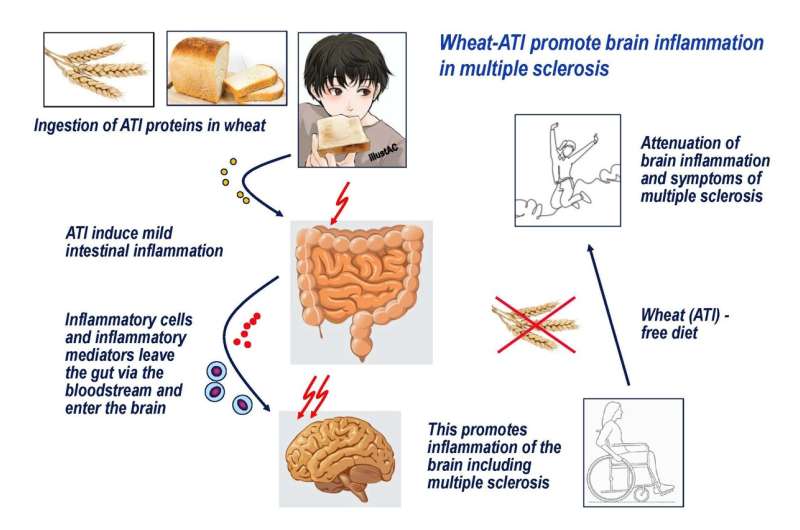This article has been reviewed according to Science X's editorial process and policies. Editors have highlighted the following attributes while ensuring the content's credibility:
fact-checked
peer-reviewed publication
proofread
Wheat diet may exacerbate multiple sclerosis severity, research finds

A research team at the University Medical Center Mainz has discovered that a diet containing wheat can increase the severity of multiple sclerosis (MS). This is due to the amylase trypsin inhibitors (ATI), natural proteins in wheat, while the gluten proteins did not influence the inflammatory reaction.
The studies confirm that diet and gut health can influence the course of chronic inflammatory diseases, including MS. What is special, is that a specific food, in this case, a defined ingredient, can promote this inflammation.
The research results were published in the journals Gut and Therapeutic Advances in Neurological Disorders. The research group now wants to investigate the extent to which a wheat-free diet can improve drug therapies for MS.
Multiple sclerosis is an autoimmune disease of the central nervous system. The immune system attacks healthy nerve cells in an overreaction, causing them to continuously die. The most common early symptoms are temporary sensory disturbances, visual disturbances and muscle paralysis.
About 2.8 million people worldwide are affected by MS, more than 250,000 of them in Germany. The prevalence is increasing significantly, especially among young adults and women. The disease is triggered by a combination of different factors. In addition to genetic factors, environmental factors such as diet can also influence the course of the chronic inflammatory disease.
"It is known that certain wheat proteins can cause inflammatory reactions. This includes celiac disease, which affects around 1% of the population. It is an inflammatory reaction of the small intestine to gluten, a protein in wheat. What is new is that other wheat proteins can generally contribute to inflammation," explains Univ.-Prof. Dr. Dr. Detlef Schuppan, Director of the Institute of Translational Immunology at the University Medical Center Mainz and Professor of Medicine at Harvard Medical School.
"Until now, however, there was no clear evidence that a wheat-containing diet can also influence inflammatory diseases of the central nervous system. We have now been able to show, both in an animal model and in a clinical pilot study, that the ATI proteins in wheat can enhance the severity of MS. These ATI proteins play a broader role in inflammation than the gluten proteins."
Amylase trypsin inhibitors (ATI) are natural proteins found in cereals such as wheat, barley and rye. The ATI proteins are hardly digested and cause mild inflammatory reactions in the intestine. However, they do not only act in the intestine: Inflammatory cells and soluble inflammatory mediators activated by ATI can also be transported from the intestine to other parts of the body through the bloodstream.
As the scientists have discovered, the ATI proteins promote existing inflammatory processes in organs such as the liver or lungs and, what's new, even in the central nervous system. As a result, the ATI proteins can exacerbate the symptoms of MS.
The research team's initial study in an animal model showed that a diet containing 25% wheat markedly worsened the symptoms of MS compared to an otherwise identical but wheat-free diet. These results could also be reproduced with a minimal amount of ATI proteins (0.15% of the feed weight), but not with a large amount of gluten proteins (5% of the feed weight).
The research team was then able to confirm the results from the animal model in a clinical pilot study. Patients with moderately severe, mildly active MS took part in this study. One study group followed a wheat-reduced diet for three months, while the other group continued their wheat-containing diet.
After the three months, the groups switched to the other diet for a further three months. The MS patients reported significantly less pain during the wheat-free diet. Fewer inflammatory immune cells were also measured in their blood.
"Our studies show how important diet, its interactions with the gut microbiome and the gut immune system are for health. A wheat-free diet can reduce the severity of MS and other inflammatory diseases. Further studies combining a wheat-free diet with other drug therapies, among other things, are planned," says Professor Schuppan.
More information: Victor F Zevallos et al, Dietary wheat amylase trypsin inhibitors exacerbate CNS inflammation in experimental multiple sclerosis, Gut (2023). DOI: 10.1136/gutjnl-2023-329562
Sinah Engel et al, Attenuation of immune activation in patients with multiple sclerosis on a wheat-reduced diet: a pilot crossover trial, Therapeutic Advances in Neurological Disorders (2023). DOI: 10.1177/17562864231170928




















